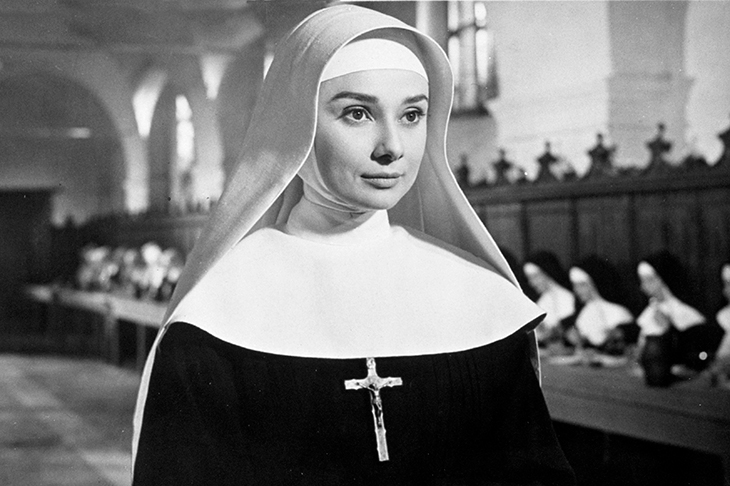Although I was 10 minutes early, Vernon was there ahead of me, framed in the ancient chapel doorway, chatting up what is by general agreement the prettiest of the nunnery’s seven sisters.
Vernon is a great bear of a man, raised in poverty in the Appalachian mountains, now wealthy, whose speaking voice is Jack Nicholson’s. A new friend, Vernon excites me because having endured real poverty he fiercely repudiates the glorification of anything that might be categorized under the heading of low life and calls me to order if I err in that direction conversationally.
Vernon had brought the nuns three bottles of his homemade olive oil in a plastic bag. I bowled up as he was handing them over. Framed by the ancient chapel door, the sloppily dressed giant and the tiny nun in the huge, starched wimple, a supermarket plastic bag suspended between, made a striking composition.
When I drew level, Vernon introduced me to the nun. I’d never met a real nun before. The nun’s face, showcased in the perfect oval of the wimple, turned to mine. From 18 inches away, her youthful prettiness, gentleness and radiant saintliness so wildly exceeded every stereotype in my imaginative arsenal that I laughed at her. Vernon looked faint and pale with desire. The sister took her leave with smiling grace and passed inside to prepare for Vespers. Vernon shook his face as though he’d walked through a spider’s web and we followed the nun inside.
The chapel interior is dark and austere. A few rows of pews, then tall, park-sized railings separating the holy from the public area. But it is the acoustics one notices first on entering. You can literally hear a pin drop. The lifting of the door latch rings out like a gunshot. And when the nuns begin to sing, their soaring, piercing voices make you look for a microphone.
The present Benedictine nuns have been recently imported from Argentina to replace the previous community of terribly old French pied-noir refugees from an Algerian nunnery. While we feared for their loudly creaking joints, we attenders loved those old French nuns too. However we do also feel as though The Mousetrap has been taken off and replaced with something brisker.
As is most often the case, Vernon and I comprised the entire congregation so we sat in the front pew, close to the railings. A bell tolled, then the seven sisters filed in from the wings as though on muffled castors and made for their stalls — three on the right, four on the left — forming two facing rows of starched, inclined wimples. Then they were off. No preamble. Just seven female voices, startling in their purity and piercing accuracy, filling the darkness and the astonished mind.
Vernon and I were away with the fairies when two shots rang out. That heavy door latch had been lifted and dropped. Two young adults and two small boys came down the aisle and filed into the other front pew. The woman crossed herself before sitting. A prosperous family, I’d say, judging by the quality of their coats, footwear and haircuts, and by the majesty of their self-possession.
The boys took less than half a minute to decide that the nuns and their singing were not worth their or their parents’ attention. They started a rival choir that was deliberately, almost Satanically, discordant. This discomposed the parents not at all. They smiled indulgently at them and then tried to entice Vernon and me to smile indulgently at them also. Glancing sideways, I could see Vernon’s eyes fixed firmly to the front and bulging ominously. Suffer the little children to come unto me, I kept telling myself.
Abandoning their choir, the two boys next competed to see who could shout random words the loudest. Then they used the pews and their parents as climbing frames. Then they ran circuits of the chapel, whooping. The parents continued to smile lovingly at their princelings and furtively at us, under the very mistaken impression that Vernon and I were appreciating the boys’ performance as much as they were.
Now Vernon stood up. As the nuns’ voices, with soaring descant harmonies, praised God, he marched across the chapel floor and stood pop-eyed before the parents and for a moment I thought he was going to start throwing uppercuts. But instead of that, thank goodness, he put his two great thumbs in the parents’ faces and gave them and their children a massive thumbs-down. Then he marched out of the chapel.
I followed him outside and caught up with him. He was apoplectic. It wasn’t so much the boys’ behavior that had enraged him as the exhibitionism of the parents, he said. But mainly it that father’s floppy hair. It was the hair that tipped him over, he said.
Funnily enough, Vernon, I said, it was that father’s hair that had annoyed me most, too.
This article was originally published in The Spectator’s March 2021 US edition.


















